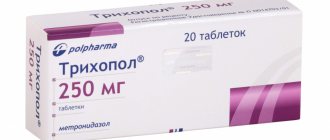Compound
The tablets include active ingredients such as ethinyl estradiol and levonorgestrel .
Additional components include: talc, colloidal silicon dioxide, lactose monohydrate, corn starch, magnesium stearate.
The shell consists of sucrose, talc, titanium dioxide, macrogol 6000, red iron oxide, calcium carbonate, copovidone, colloidal silicon dioxide, povidone, carmellose sodium.
Pharmacodynamics and pharmacokinetics
The drug belongs to the contraceptive combination drugs.
Levonorgestrel reduces the production of gonadotropic hormones , as a result of which the egg matures more slowly and ovulation does not occur.
Ethinyl estradiol , in turn, increases the viscosity of cervical mucus and reduces the likelihood of sperm passing into the uterus.
In addition, Tri-Regol helps normalize the menstrual cycle, as it supplements the level of endogenous hormones .
The drug is well absorbed in the intestine when administered orally. It is processed in the intestines and liver, then excreted through the kidneys and intestines.
Pharmacological properties of the drug Tri-regol
Tri-Regol is a three-phase oral hormonal contraceptive that has an inhibitory effect on ovulation. Contains levonorgestrel (D-13β-ethyl-17α-ethynyl-17β-hydroxy-4-gonen-3-one) and ethinyl estradiol (17α-ethinyl estratriene-1,3,5(10)-diol-3,17β). Consecutive administration of tablets of the drug containing different amounts of gestagen (levonorgestrel) and estrogen (ethinyl estradiol) ensures a concentration of these hormones in the blood that corresponds to their concentration during the normal menstrual cycle and promotes the secretory transformation of the endometrium. When taken orally, the drug is quickly and completely absorbed into the gastrointestinal tract. The maximum concentration of ethinyl estradiol in the blood plasma is achieved after 90 minutes, and levonorgestrel - after 2 hours. Metabolized in the liver. The half-life is 2–7 hours. The active substances are excreted: levonorgestrel - 60% in urine, 40% in feces; ethinyl estradiol - 40% in urine, 60% in feces. Both components pass into breast milk.
Contraindications
The use of the drug is contraindicated in:
- over 40 years of age;
- pregnancy and breastfeeding ;
- history of severe itching and idiopathic jaundice
- gallbladder diseases;
- smoking at the age of 35 years;
- thromboembolism and thrombosis , as well as predisposition to them;
- diabetes mellitus in severe form;
- improper fat metabolism;
- hydatidiform mole;
- migraine;
- otosclerosis with hearing problems;
- recent surgical operations;
- deficiency of the enzyme that is needed to digest lactose in milk;
- hypersensitivity to the components of the drug;
- liver diseases;
- history of severe cardiovascular and cerebrovascular changes;
- vaginal bleeding of unknown etiology;
- sickle cell and hemolytic anemia ;
- malignant tumors;
- chronic colitis;
- Marfan syndrome;
- phlebitis;
- extensive injuries.
This medicine should be used with caution when:
- bronchial asthma;
- chronic venous insufficiency of the lower extremities;
- epilepsy;
- chorea minor;
- porphyria;
- uterine fibroids;
- depression;
- diabetes mellitus at the stage of compensation (in the absence of vascular complications);
- multiple sclerosis;
- arterial hypertension (BP up to 160/100 mm Hg);
- tetany;
- mastopathy;
- tuberculosis;
- lack of a regular menstrual cycle during adolescence.
Contraindications to the use of the drug Tri-regol
Pregnancy and lactation, recent hepatitis, liver dysfunction (including Gilbert, Dubin-Johnson, Rotor syndromes), a history of jaundice or severe skin itching, cholelithiasis, cholecystitis, chronic colitis, herpes during previous pregnancies, severe organic heart disease, severe hypertension (arterial hypertension), severe diabetes mellitus and other endocrine diseases, lipid metabolism disorders, predisposition to thrombosis, a history of indications of cerebrovascular diseases, malignant tumors, primarily of the breast and genital organs, sickle-shaped cellular anemia, chronic hemolytic anemia, convulsions, vaginal bleeding of unknown etiology, migraine, otosclerosis, history of idiopathic jaundice of pregnant women, hypersensitivity to the drug.
Side effects
Side effects of Tri-Regol are usually the following: discomfort when using contact lenses, intermenstrual bleeding, weight changes, nausea, fluid retention, changes in libido, a feeling of tension in the mammary glands, acne, irritability , depression , increased excitability, pain in the mammary glands, headache , migraine , blurred vision, hypomenorrhea , amenorrhea .
These side effects are temporary and go away without special treatment. In rare cases, tumors may develop, lupus erythematosus , ulcerative colitis , hepatitis , Crohn's disease , and jaundice may .
In addition, an increase in the amount of triglycerides in the blood plasma, a decrease in glucose tolerance, fatigue, increased blood sugar, chorea , otosclerosis , pulmonary embolism thrombophlebitis of the deep veins of the lower extremities, increased blood pressure, venous thrombosis , vomiting , cholelithiasis were rarely observed. , diarrhea , pancreatitis , skin rashes exudative erythema multiforme , hair loss, urticaria , erythema nodosum , changes in vaginal secretion, chloasma , the appearance of secretions from the mammary glands, vaginal mycoses
Adverse reactions such as dizziness , worsening epilepsy , hypertrichosis , seborrhea , and a feeling of heaviness in the legs are also possible.
Special instructions for the use of the drug Tri-regol
Before starting to use the drug, it is necessary to conduct a general medical and gynecological examination (primarily measuring blood pressure, determining the level of sugar in the urine, testing liver function, examining the mammary glands, cytological smear analysis) to exclude risk-related diseases and pregnancy. In women with a family history of thromboembolic diseases at a young age or bleeding disorders, the use of Tri-Regol is not allowed. Particular caution should be observed when prescribing the drug to patients with diabetes mellitus, heart disease of non-ischemic etiology, impaired renal function, hypertension (arterial hypertension), varicose veins, phlebitis, otosclerosis, multiple sclerosis, epilepsy and migraine (or if there is a history of these diseases). ); in the presence of minor chorea, intermittent porphyria, hidden tetany, asthma, benign uterine tumors, endometriosis or mastopathy. While taking the drug, medical monitoring is necessary approximately every 6 months. Oral hormonal contraception can be used no earlier than 6 months after viral hepatitis, provided that liver function indicators are normalized. With long-term use of sex hormones, benign and very rarely malignant liver tumors were rarely detected. If acute abdominal pain or bleeding occurs, the presence of a hepatocellular tumor should be excluded. If sharp pain appears in the upper abdomen, hepatomegaly and signs of intra-abdominal hemorrhage, a suspicion of a liver tumor may arise. If necessary, stop taking the drug. If there is no bleeding when stopping the drug, you can continue taking it only after pregnancy has been ruled out. While using the drug, patients with impaired liver function should undergo therapeutic examination every 2–3 months. If intermenstrual bleeding occurs, Tri-Regol should be continued, since in most cases this bleeding stops spontaneously. If intermenstrual bleeding does not stop or recurs, a gynecological examination should be performed to exclude gynecological pathology. In cases of vomiting or diarrhea, taking pills should be continued, but an additional method of contraception must be used. Women who have used oral contraceptives containing estrogens may have an increased risk of developing thromboembolism and thrombosis of various locations. This risk increases with age and mainly in women who smoke. Therefore, women over the age of 30 are advised to completely stop smoking. The drug must be stopped at least 3 months before the planned pregnancy. You should stop taking the pills immediately:
- if pregnancy is suspected;
- in case of development of a migraine-type headache, with a significant deterioration in visual acuity, if thrombosis or myocardial infarction is suspected;
- with a sharp increase in blood pressure, jaundice or hepatitis without jaundice, with intense itching of the whole body, epilepsy or increased frequency of epileptic seizures;
- during a planned operation (6 weeks before surgery), during prolonged immobilization.
Instructions for use of Tri-Regol (Method and dosage)
The instructions for Tri-Regol describe that you should take one tablet per day at the same time. The course begins on the first day of menstruation and lasts 21 days. After this there should be a week's break for menstrual bleeding. After this, the tablets are started again from the first package (even if there is still bleeding). First you need to take 6 pink tablets, then 5 white ones and then 10 yellow ones.
In the package, the order of taking the medicine is indicated by numbers and arrows. If one package contains 28 tablets, after taking the dark yellow ones, you should move on to the brown ones (they do not contain hormones), and the next course of 28 days should be started without interruptions.
If a pill is missed (more than 36 hours have passed), the reliability of contraceptive protection is not guaranteed. In the first and second weeks of the cycle, in case of such a miss, the instructions for using Tri-Regol advise taking 2 tablets at once the next day.
If you miss 2 tablets in a row, you need to take 2 tablets for the next 2 days, then continue the course as usual. If you miss a course in the third week, there is no seven-day break.
Skipping pills does not apply to browns. They contain iron and are used to maintain continuity.
If the drug is prescribed for treatment, its dosage is adjusted individually.
Tri-regol No. 63 tablets (3*21)
Tri-regol No. 63 tablets (3*21)
Release form
Film-coated tablets
Package
1 blister contains 6 pink-coated tablets, 5 white-coated tablets, 10 dark yellow-coated tablets. There are 3 blisters in a cardboard pack.
63 pcs Pharmacological action
Pharmacodynamics Combined (three-phase) oral contraceptive estrogen-progestogen drug. When taken, it inhibits the pituitary secretion of gonadotropic hormones. Sequential administration of film-coated tablets containing varying amounts of progestin (levonorgestrel) and estrogen (ethinyl estradiol) provides concentrations of these hormones in the blood close to their concentrations during the normal menstrual cycle and promotes the secretory transformation of the endometrium. The contraceptive effect is associated with several mechanisms. Under the influence of levonorgestrel, the release of releasing factors (luteinizing and follicle-stimulating hormones) of the hypothalamus is blocked, the secretion of gonadotropic hormones by the pituitary gland is inhibited, which leads to inhibition of the maturation and release of an egg ready for fertilization (ovulation). Ethinyl estradiol maintains the high viscosity of cervical mucus (it makes it difficult for sperm to enter the uterine cavity). Along with the contraceptive effect, the menstrual cycle is normalized by replenishing the level of endogenous hormones with the hormonal components of Tri-Regol® tablets. In seven-day periods, when the next break in taking the drug follows, uterine bleeding occurs.
Pharmacokinetics Levonorgestrel is rapidly absorbed (less than 4 hours). Levonorgestrel does not have a first-pass effect through the liver. The half-life is 8-30 hours (average 16 hours). Most of the levonorgestrel in the blood is bound to albumin and sex hormone-binding globulin. Ethinyl estradiol is rapidly and almost completely absorbed from the gastrointestinal tract. The maximum concentration in plasma is achieved in the range of 1-1.5 hours. The half-life is 26±6.8 hours. Ethinyl estradiol has a “first pass” effect through the liver (the so-called “first pass” effect). Metabolism occurs in the liver and intestines. When taken orally, ethinyl estradiol is released from the blood plasma within 12 hours. Ethinyl estradiol metabolites: water-soluble derivatives of sulfate or glucuronide conjugation enter the intestine with bile, where they undergo disintegration with the help of intestinal bacteria. 60% of levonorgestrel is excreted by the kidneys, 40% by the intestine, 40% of ethinyl estradiol is excreted by the kidneys and 60% by the intestine.
Indications
Oral contraception.
Contraindications
Hypersensitivity to any component of the drug. Pregnancy, breastfeeding, severe liver diseases, liver tumors, congenital hyperbilirubinemia (Gilbert, Dubin-Johnson and Rotor syndromes), cholelithiasis, cholecystitis, chronic colitis; the presence or indication in the anamnesis of severe cardiovascular (including decompensated heart defects) and cerebrovascular changes, thromboembolism and predisposition to them, phlebitis of the deep veins of the lower extremities, hormone-dependent malignant neoplasms of the genital organs and mammary glands (including suspicion of them), familial forms of hyperlipidemia, arterial hypertension with systolic/diastolic blood pressure 160/100 mm Hg. and above, surgical interventions, surgical operations on the lower extremities, prolonged immobilization, extensive trauma, pancreatitis (including a history), accompanied by severe hypertriglyceridemia and hyperlipidemia, jaundice due to taking medications containing steroids, severe forms of diabetes mellitus, sickle cell anemia, chronic hemolytic anemia, vaginal bleeding of unknown etiology, migraine, hydatidiform mole, otosclerosis with worsening during previous pregnancy(ies); idiopathic jaundice of pregnant women, severe skin itching of pregnant women, history of herpes during pregnancy; smoking over the age of 35, age over 40; lactase deficiency, lactose intolerance, glucose-galactose malabsorption (the dosage form of the drug contains lactose).
WITH CAUTION Compensated diabetes mellitus without vascular complications, arterial hypertension with systolic/diastolic blood pressure up to 160/100 mm Hg, varicose veins, multiple sclerosis, epilepsy, chorea minor, porphyria, tetany, bronchial asthma, adolescence (without regular ovulatory cycles), uterine fibroids, mastopathy, depression, tuberculosis.
Use during pregnancy and breastfeeding
During pregnancy and lactation, taking Tri-Regol® is contraindicated.
special instructions
Before starting to use the drug, it is necessary to exclude pregnancy and conduct a general medical and gynecological examination (breast examination, cytological smear analysis). While taking the drug, regular gynecological examinations are required every 6 months. The use of oral contraception is allowed no earlier than 6 months after viral hepatitis and subject to normalization of liver functions. If sharp pain appears in the upper abdomen, hepatomegaly or signs of intra-abdominal hemorrhage, a liver tumor may be suspected. In this case, taking the drug should be stopped. If acyclic bleeding occurs, it is possible to continue taking Tri-Regol® after the attending physician has ruled out organic pathology. If abnormal liver function is detected during the use of the drug, the question of the advisability of continuing to take the drug Tri-Regol® should be decided. In case of vomiting or diarrhea, the drug should be continued, and it is recommended to additionally use another, non-hormonal method of contraception. At least 3 months before the planned pregnancy, the drug must be stopped. Under the influence of oral contraceptives (due to the estrogen component), some laboratory parameters may change (functional parameters of the liver, kidneys, adrenal glands, thyroid gland, blood coagulation and fibrinolytic factors, levels of lipoproteins and transport proteins).
Taking the drug should be stopped immediately in the following cases: - if a migraine-like or unusually severe headache appears for the first time or worsens, if there is an acute deterioration in visual acuity, if thrombosis or heart attack is suspected; - with a sharp increase in blood pressure, the appearance of jaundice or hepatitis without jaundice, the occurrence of generalized itching or an increase in epileptic seizures; - upon pregnancy; - 6 weeks before the planned operation, with prolonged immobilization (for example, after injury).
Effect of the drug on the ability to drive a car and operate other mechanisms. Taking the drug does not affect the ability to drive a car or operate other mechanisms.
Compound
active substances: Tablets I: contain 0.03 mg ethinyl estradiol and 0.05 mg levonorgestrel, Tablets II: contain 0.04 mg ethinyl estradiol and 0.075 mg levonorgestrel, Tablets III: contain 0.03 mg ethinyl estradiol and 0.125 mg levonorgestrel. excipients Tablets I. Core: colloidal silicon dioxide, magnesium stearate, talc, corn starch, lactose monohydrate (33.0 mg). Shell: sucrose, talc, calcium carbonate, titanium dioxide (E171), copovidone, macrogol 6000, colloidal silicon dioxide, povidone, carmellose sodium, red iron oxide (E172). Tablets II. Core: colloidal silicon dioxide, magnesium stearate, talc, corn starch, lactose monohydrate (33.0 mg). Shell: sucrose, talc, calcium carbonate, titanium dioxide (E171), copovidone, macrogol 6000, colloidal silicon dioxide, povidone, carmellose sodium. Tablets III. Core: colloidal silicon dioxide, magnesium stearate, talc, corn starch, lactose monohydrate (33.0 mg). Shell: sucrose, talc, calcium carbonate, titanium dioxide (E171), copovidone, macrogol 6000, colloidal silicon dioxide, povidone, carmellose sodium, yellow iron oxide (E172).
Directions for use and doses
Using the drug for the first time: Take orally at the same time of day, if possible in the evening, without chewing and with a small amount of liquid. For the purpose of contraception in the first cycle, Tri-Regol® is prescribed daily, 1 tablet/day. for 21 days, starting from day 1 of the menstrual cycle, then take a 7-day break, during which typical menstrual bleeding occurs. The next package containing 21 film-coated tablets should be taken on the 8th day after a 7-day break. The drug is taken as long as there is a need for contraception. When switching from another oral contraceptive to taking Tri-Regol®, a similar scheme is used. After an abortion, it is recommended to start taking the drug on the same or the next day after the operation. After childbirth, taking the drug is recommended exclusively for women who are not breastfeeding. Reception should begin no earlier than the first day of menstruation or cycle. During lactation, the use of the drug is contraindicated. If a woman does not take Tri-Regol® within the prescribed period, she should take the missed pill within the next 12 hours. If 36 hours have passed after taking the pill, contraception cannot be considered reliable. However, in order to avoid intermenstrual bleeding, it is necessary to continue taking the drug from the already started package minus the missed tablet(s). At this time, it is recommended to additionally use another, non-hormonal method of contraception (for example, barrier).
Side effects
Side effects observed with the use of the drug are classified into categories depending on the frequency of their occurrence: very often ≥1/10; often >1/100, ≤1/10, sometimes ≥1/1000, ≤1/100; rarely ≥1/10000, ≤1/1000; very rarely ≤1/10000 including isolated reports. Nausea, vomiting, headache, engorgement of the mammary glands, increased body weight, decreased libido, depressed mood, chloasma, intermenstrual bleeding, in some cases - swelling of the eyelids, conjunctivitis, blurred vision, discomfort when wearing contact lenses (these phenomena are temporary and disappear after discontinuation without prescribing any therapy). Rarely, increased concentrations of triglycerides, blood glucose, decreased glucose tolerance, increased blood pressure, jaundice, hepatitis, liver adenoma, gallbladder diseases (for example, cholelithiasis, cholecystitis), thrombosis and venous thromboembolism, skin rash, hair loss, increased discharge from vaginal candidiasis, increased fatigue, diarrhea. With long-term use, generalized itching, cramps of the calf muscles, hearing loss, increased frequency of epileptic seizures, and deepening of the voice may very rarely occur.
Drug interactions
Use the drug with caution when taking simultaneously:
ampicillin, rifampicin, chloramphenicol, neomycin, polymyxin B, sulfonamides, tetracyclines, dihydroergotamine, tranquilizers, phenylbutazone, since these drugs can weaken the contraceptive effect, it is recommended to additionally use another, non-hormonal contraceptive method; anticoagulants, coumarin or indanedione derivatives (it may be necessary to urgently determine the prothrombin index and change the dose of the anticoagulant); tricyclic antidepressants, maprotiline, beta-blockers (bioavailability and therefore toxicity may increase); oral hypoglycemic drugs, insulin (it may be necessary to change their doses); bromocriptine (reduced effectiveness); drugs with possible hepatotoxic effects, primarily dantrolene (risk of increased hepatotoxicity, especially in women over 35 years of age).
Overdose
Symptoms: nausea, uterine bleeding. Treatment: when the first signs of overdose appear in the first 2-3 hours, gastric lavage is recommended. Symptomatic therapy is indicated. There is no antidote.
Storage conditions
The drug should be stored at a temperature of 15° to 30°C.
Best before date
5 years.
Conditions for dispensing from pharmacies Dispensed with a doctor's prescription
Interaction
Tri-Regol should be taken with caution in combination with:
- Ampicillin , chloramphenicol , Penicillin B , tetracyclines , Dihydroergotamine , Phenylbutazone , Rifampicin , Neomycin , sulfonamides , some anticonvulsants and tranquilizers, Ketonazole - may reduce the effectiveness of the contraceptive;
- tricyclic antidepressants , beta blockers , Maprotiline - it is possible to increase the bioavailability and toxicity of these drugs;
- Bromocriptine – effectiveness may decrease;
- anticoagulants , derivatives of indandione or coumarin - there may be a need to monitor prothrombin time and adjust dosages;
- antidiabetic medications for oral use, insulin - dosage adjustment may be necessary;
- hepatotoxic agents – increased risk of increased hepatotoxicity.
Reviews about Tri-Regol
birth control pills receive very different reviews, like most other hormonal contraceptives. For some they are ideal, but for others they experience many unwanted side effects. Although the majority of reviews about Tri-Regol are still positive. Some girls even “prescribe” it to themselves, without consulting specialists. And in most cases, problems with pregnancy are not observed after stopping the course.
Doctors' opinions about Tri-Regol are usually positive. They are often prescribed to patients to normalize the menstrual cycle. Reviews from doctors about Tri-Regol boil down to the fact that it is a relatively harmless remedy for little money. However, the effect of oral contraceptives is very individual. Some specialists neglect the necessary tests, so it also happens that the drug is not suitable for a number of indicators for the patients to whom it was prescribed. This leads to the appearance of unwanted side reactions. So Tri-Regol should be prescribed only after appropriate tests.
Tri-Regola price, where to buy
The price of Tri-Regol in comparison with a number of similar products is considered very affordable. That is why it is often recommended by experts. The price of Tri-Regola in a package for 21 tablets is on average about 200 rubles.
- Online pharmacies in RussiaRussia
- Online pharmacies in UkraineUkraine
- Online pharmacies in KazakhstanKazakhstan
ZdravCity
- Tri-Regol tablets 21 pcs. JSC Gedeon Richter
300 rub. order - Tri-Regol tablets 63 pcs. JSC Gedeon Richter
RUR 714 order
Pharmacy Dialogue
- Tri-regol (tab. No. 21) Gedeon-Richter
RUB 291 order
- Tri-regol (tab. No. 21x3)Gedeon-Richter
625 rub. order
show more
Pharmacy24
- Tri-regol No. 63 tablets VAT "Gedeon Richter", Ugorshchina
672 UAH. order - Tri-regol No. 21 tablets VAT "Gedeon Richter", Ugorshchina
220 UAH order
PaniPharmacy
- Three Regol tablets Tri-Regol tablets. p/o No. 63 Hungary, Gedeon Richter
798 UAH. order
- Three Regol tablets Tri-Regol tablets. p/o No. 21 Hungary, Gedeon Richter
257 UAH order
show more



